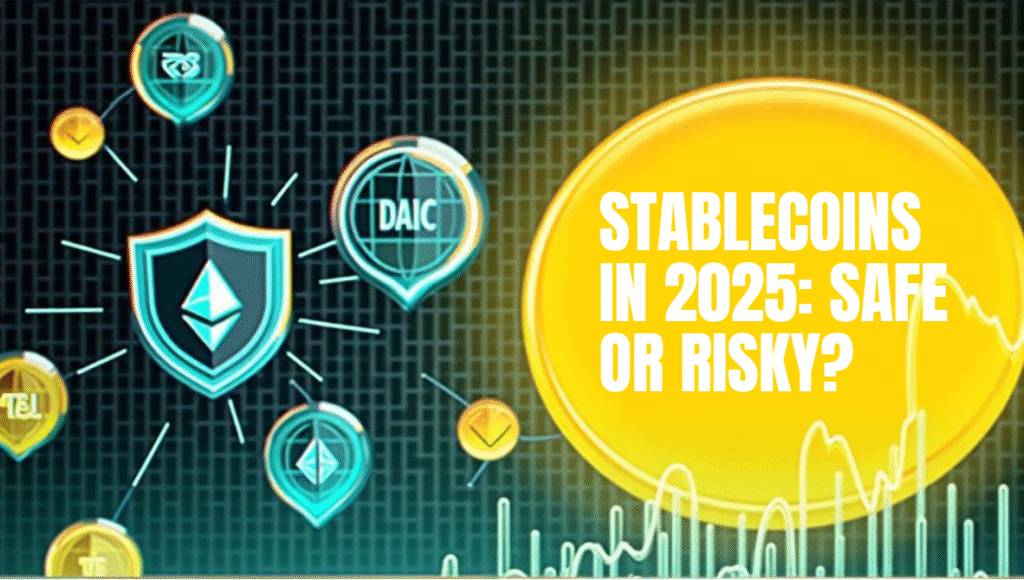🧠 Why This Topic Matters in 2025

In 2025, crypto has matured — but it’s also more volatile, more regulated, and more essential to understand than ever.
Many Indian investors ask:
- Are stablecoins still “stable” in a post-FTX, post-US banking crisis world?
- What are the smartest long-term crypto strategies in a high-tax, uncertain environment?
Let’s break down both — and help you make secure, wealth-building decisions in the crypto market.
🪙 What Are Stablecoins — And Are They Still Safe in 2025?
Stablecoins are cryptocurrencies pegged to stable assets, like the US Dollar (USD), to protect users from volatility.
✅ Top Stablecoins in 2025:
- USDT (Tether) – Still dominant, but under scrutiny
- USDC (Circle) – Gaining ground with institutional trust
- DAI (MakerDAO) – Decentralized, algorithmic option
- INR-backed coins (like INRx or BharatCoin) – Gaining popularity in India
⚠️ Are They Actually “Stable” in 2025?
Here’s the real-world view:
| Stablecoin | Peg Stability | Reserve Transparency | Regulatory Status |
|---|---|---|---|
| USDT | ✅ Medium-Stable | ❌ Limited audits | ❗ Mixed globally |
| USDC | ✅ Highly Stable | ✅ Fully audited | ✅ Approved in US, EU |
| DAI | ⚠️ Algorithm-based | ✅ Transparent on-chain | ❌ Less regulation |
Verdict:
- USDC is the most stable option for Indians using exchanges like Coinbase or CoinDCX
- USDT is still widely used, but diversify holdings if storing long-term
- Avoid algorithmic or unknown INR-backed coins unless audited
🇮🇳 How Should Indian Investors Use Stablecoins?
✅ Use stablecoins to hedge against INR volatility (INR/USD reached ₹85 in May 2025)
✅ Ideal for crypto P2P payments, staking, or short-term holding
⚠️ Don’t store large savings in just one stablecoin
✅ Watch for RBI regulations — INR-backed CBDCs may disrupt usage
💼 5 Crypto Investment Strategies for Long-Term Wealth (2025 Edition)
Stablecoins may be safe — but growth comes from smart crypto investments. Here’s how to build long-term wealth while managing risk.
1️⃣ The 60/20/20 Diversified Crypto Portfolio
| Asset Type | Allocation | Purpose |
|---|---|---|
| Blue-Chip Cryptos | 60% | BTC, ETH – long-term hold |
| Stablecoins (USDC) | 20% | Hedge & liquidity |
| Altcoins/Narrative Coins | 20% | Growth potential (e.g., Layer-2s, AI coins) |
✅ Rebalance quarterly
✅ Store securely (hardware wallet or trusted exchange)
2️⃣ Dollar-Cost Averaging (DCA)
Invest fixed amounts weekly/monthly instead of lump sums.
✅ Reduces risk of bad market timing
✅ Works well with volatile assets like Bitcoin, Ethereum
Example:
Invest ₹2,000 every Monday into ETH regardless of price
3️⃣ Staking and Yield Farming — Safely
Many blockchains offer staking rewards (4–12%).
Only use trusted platforms like:
- Lido (ETH)
- Coinbase or Binance staking
- Polygon or Solana validators
⚠️ Avoid shady DeFi platforms promising 30%+ returns — many collapsed in 2022–2023.
4️⃣ Invest in Real-World Utility Coins
Focus on crypto projects with actual use cases, such as:
- Chainlink (LINK) – For DeFi data oracles
- Polygon (MATIC) – For Web3 development (used heavily in India)
- Filecoin (FIL) – Decentralized storage
These aren’t hype coins — they’re infrastructure.
5️⃣ Stay Tax-Smart in India
In India, crypto gains are taxed at 30% + 1% TDS.
✅ Use apps like KoinX or Zerion to track capital gains
✅ Consider holding longer to reduce taxable trades
✅ Book losses to offset gains when legal
🔐 Bonus: Tools Every Indian Crypto Investor Should Use in 2025
| Tool | Purpose |
|---|---|
| CoinDCX | Easy INR-crypto trading in India |
| Binance | Global access to altcoins |
| KoinX | Crypto tax tracking |
| MetaMask | Secure DeFi wallet |
| Ledger Nano X | Offline cold storage wallet |
📌 Final Thoughts: Play It Safe, Play It Long
Stablecoins offer safety, not returns.
Altcoins offer returns, not safety.
A balanced, diversified, strategy-based approach is what Indian crypto investors need in 2025.
Avoid hype. Understand regulation. Track your moves.
And always remember: Crypto is a marathon — not a lottery ticket.
